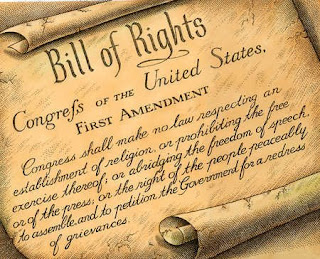NDAA Signed into Law
Without a lot of fanfare, while President Obama vacationed in Hawaii with his family, yesterday, December 31, 2011, he paused to take time to sign the National Defense Authorization Act into law. (NDAA (HR 1540)).
To understand how this federal law will affect the future of all Americans and our freedoms, please read this article that was written and published by a Canadian legal scholar, Michele Chossudovsky today, January 1, 2012.
THE INAUGURATION OF POLICE STATE USA 2012. Obama Signs the “National Defense Authorization Act ". http://www.globalresearch.ca/index.php?context=va&aid=28441#
If all these observations are true and we are now living in a new America where this law, the NDAA, supersedes our freedoms guaranteed in the U.S. Constitution, I am very sad and upset about it and I will leave it at that.
References:
Ballard, Spahr, Andrews, Ingersoll, LLC. (2004) Privacy
Law. [Electronic version.] Retrieved from the web on May 14, 2004 at http://www.virtualchase.com/resources/privacy.html.
Chossudovsky, M. (2012). THE INAUGURATION OF POLICE STATE
USA 2012. Obama Signs the “National Defense Authorization Act ". An article published on January 1, 2012 at
Globalresearch.ca. Retrieved from the
web at http://www.globalresearch.ca/index.php?context=va&aid=28441#
on January 1, 2012.
Department of Homeland Security. (2009). (U//FOUO) Rightwing Extremism: Current Economic and Political Climate
Fueling Resurgence in Radicalization and Recruitment. Retrieved from the web at http://www.fas.org/irp/eprint/rightwing.pdf on December 24, 2011.
Department of Justice (2004). USA PATRIOT Act at Work. Retrieved from the web at
http://www.justice.gov/olp/pdf/patriot_report_from_the_field0704.pdf on December 24, 2011.
Doyle, C. (2002).
USA PATRIOT Act: A sketch.
Retrieved from the web at http://www.fas.org/irp/crs/RS21203.pdf on December 24, 2011.
Doyle, C. (2010).
National Security Letters in Foreign Intelligence Investigations: A
Glimpse of the Legal Background and Recent Amendments - a CRS Report Dated
December 27, 2010. Retrieved from the
web at http://www.fas.org/sgp/crs/intel/RS22406.pdf on December 24, 2011.
Electronic Privacy and Information Center Resources about
the USA PATRIOT Act http://epic.org/privacy/terrorism/usapatriot/
.
EPIC. (2011). Information Related to the USA PATRIOT Act.
Retreived from the web at http://epic.org/privacy/terrorism/usapatriot/ on December 9, 2011.
Legal Information Institute. (2004). Right of Privacy, An
Overview. An article from Cornell Law School. [Electronic version.] Retrieved
from the web on May 14, 2004 at http://www.law.cornell.edu/topics/privacy.html .
Reynolds, G. W. (2012). Ethics in Information Tehnology,
4th edition. Boston, MA: Course Technology.
Riggs, M. (2011).
Lee County Deputies Tied Suspect to a Chair, Gagged Him, and
Pepper-Sprayed Him to Death. An article
published at Reason.com on December 23, 2011. Retrieved from the web at http://reason.com/blog/2011/12/23/lee-county-deputies-tied-suspect-to-a-ch
on December 23, 2011.
The White House. (2009). Cyberspace Policy Review. A
document published by the Obama Administration. Retrieved from the web at http://info.publicintelligence.net/cyberspace_policy_review_final.pdf on December 9, 2011.
ThinkExist.com. (2011).
Benjamin Franklin Quotes. Retrieved
from the web at http://thinkexist.com/quotation/those_who_desire_to_give_up_freedom_in_order_to/12888.html
on December 30, 2011.
U.S. Congress. (1987). The Computer Security Act of 1987.
101 STAT. 1724, Public Law 100-235, 100th Congress. Retrieved from the web http://www.nist.gov/cfo/legislation/Public%20Law%20100-235.pdf on December 9, 2011.
U.S. Government. (2009). American Recovery and Reinvestment
Act of 2009. 101 STAT. 1724, Public Law 100-235, 100th Congress. Retrieved from
the web http://www.opencongress.org/bill/111-s1/show on December 9, 2011.
U.S. Government.
(2001). USA PATRIOT Act. Retrieved from the web at http://frwebgate.access.gpo.gov/cgi-bin/getdoc.cgi?dbname=107_cong_public_laws&docid=f:publ056.107.pdf on December 24, 2011.
U.S. Government. (2011). National Defense Authorization Act. Retrieved from the web at http://www.gpo.gov/fdsys/pkg/BILLS-112hr1540rh/pdf/BILLS-112hr1540rh.pdf on January 2, 2012.
U.S. Government. (2011). National Defense Authorization Act. Retrieved from the web at http://www.gpo.gov/fdsys/pkg/BILLS-112hr1540rh/pdf/BILLS-112hr1540rh.pdf on January 2, 2012.
U.S. Government. (1776). The Declaration of Independence.
Retrieved from the web at http://www.billslater.com/tj1776.htm on November 6, 2011.
U.S. Government. (1791). U.S. Constitution. Retrieved from
the web at
http://www.billslater.com/wfs_us_constitution.htm on November 6, 2011.
Wikipedia. (2011). USA PATRIOT Act. A Wikipedia article
retrieved from the web at
http://en.wikipedia.org/wiki/Usa_patriot_act on November 6, 2011.
= = = = = = = = = = = = = = = = = = = = = = =
William Favre Slater, III
MBA, M.S., PMP, CISSP, SSCP, CISA, ISO 27002,
ISO 20000, ITIL v3, Cloud Computing Foundation
Project Manager / Program Manager
Chicago, IL
United States of America
Career
Certifications
Credentials
ISO 27001









